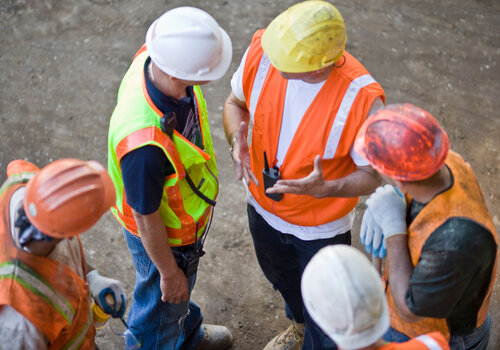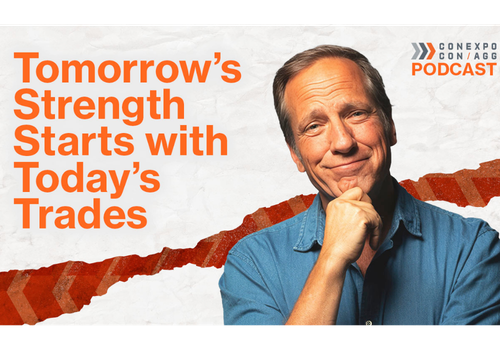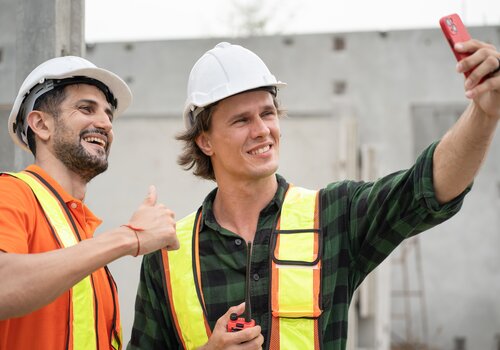As we observe Mental Health Awareness Month throughout the month of May, it's an important reminder to spotlight a pressing issue within the construction industry: the mental well-being of its workforce. While physical safety has long been a focal point, mental health challenges and solutions are finally being addressed. As awareness grows, it's crucial to address the unique challenges faced by construction professionals and foster a culture that prioritizes mental well-being.
CONEXPO-CON/AGG has a mental wellness community dedicated to sharing compelling narratives and practical advice from real men and women in the construction industry. Here you can find actionable tips for better managing your mental health, advice on how to approach conversations with others that are struggling, and discussions about how we can all change the approach to mental health in the industry for the better.
THE HIDDEN STRUGGLES
Construction workers are at a heightened risk for mental health issues, including depression, anxiety and substance use disorders. The demanding nature of the job—long hours, physical strain, job insecurity and a culture that often stigmatizes vulnerability—contributes to these challenges. The industry's "tough guy" culture often discourages open discussions about mental well-being, leading many to suffer in silence.
According to the Centers for Disease Control & Prevention (CDC), the construction industry has the highest suicide rates by occupation. Coupled with the fact that there is one death by suicide every 11 minutes, there is clearly a mental health crisis in the U.S. – and even more so in construction.
"In construction, for every death due to worksite injury, there are five suicides," said Dave Lersch, MBA, is Vice President of Administrative Operations at Miller Bros. Const.
UNDERLYING FACTORS
Several factors contribute to the heightened mental health risks in construction:
- Physically Demanding Work: Long hours and strenuous labor can lead to chronic pain and fatigue impacting mental well-being.
- Job Insecurity: The cyclical nature of construction projects often results in financial instability and stress.
- Stigma: The long-prevailing culture that discourages open discussions about mental health, leading many to suffer in silence.
- Substance Abuse: The industry has a substance abuse disorder rate nearly double the national average, often used as a coping mechanism.
BREAKING THE STIGMA
Leadership plays a pivotal role in transforming workplace culture "It is impactfully compelling when leaders and peers in the workplace are willing to share their own mental health challenges and successes," said Bob VandePol, LMSW. By fostering an environment where mental health conversations are normalized, companies can encourage employees to seek help without fear of judgment.
Addressing mental health in construction requires a multifaceted approach:
- Education and Awareness: Implement training programs to recognize signs of mental distress and promote open conversations.
- Access to Resources: Provide Employee Assistance Programs (EAPs) and ensure workers know how to access mental health services.
- Leadership Engagement: Encourage leaders to model supportive behaviors and prioritize mental well-being.
- Peer Support: Foster a culture where colleagues look out for one another and offer support.
As noted by industry expert L. Casey Chosewood, M.D., director of the NIOSH Office of Total Worker Health, "Positive work conditions, like fair treatment, recognition, meaningful work and social support allow employees to become engaged and thrive at work." These conditions not only enhance mental well-being but also contribute to increased productivity and job satisfaction.
TAKING ACTION ALL YEAR LONG
The construction industry is at a pivotal moment with mental wellness becoming a topic more openly discussed by companies of all sizes. By acknowledging the mental health challenges faced by workers and taking proactive steps, companies can create a safer more supportive environment.
As Josh Ierna, safety manager at Tilcon Connecticut aptly stated, "We're going to see the same statistics, regardless of the resources we talk about if we just keep running businesses the same exact way in the industry." It's time for a change—one that prioritizes the mental well-being of those who build our world.”
Organizations like the Construction Industry Alliance for Suicide Prevention emphasize the need for consistent and compassionate conversations about mental health throughout the year, not just during designated awareness months. Sonya Bohmann, Executive Director of the alliance, states, “There are lots of conversations in May when it’s mental health month, and there’s lots of conversations in September when it’s suicide prevention month. But the other 10 months of the year need to be part of the conversation as well.”
If you or someone you know is struggling, the 988 Suicide & Crisis Lifeline offers 24/7, free, and confidential support. Dial or text 988 to connect with a trained crisis counselor. Visit the CONEXPO-CON/AGG mental wellness community for actionable resources and real life stories from construction professionals.
Photo Courtesy CONEXPO-CON/AGG












